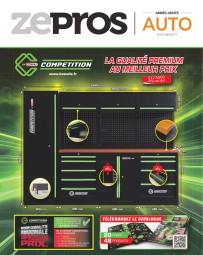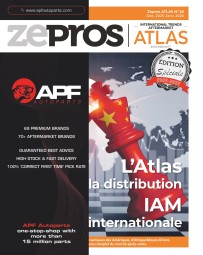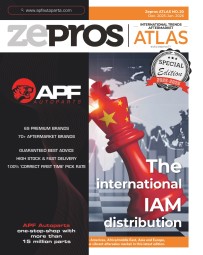
Gaël Escribe, Nexus: "Transitioning from a purchasing consortium to a group structure"
Nexus Automotive International is gearing up to commemorate its tenth anniversary in March. Ahead of this milestone, Gaël Escribe (CEO) shares insights into trends and challenges shaping the global aftermarket, projected to reach €1,196 billion by 2030.
How is the end of 2023 looking for the global aftermarket?
Gaël Escribe: As of the end of September, China emerges as the definitive weak point of the year, experiencing the poorest aftermarket performance globally. The post-Covid-19 recovery has proven challenging, significantly impacting Chinese consumption. Furthermore, the city of Shanghai, renowned for its high electrification rate, has affirmed the adverse effects on after-sales activities caused by a fleet that is both extensively young and electrified. Serving as a real-world experiment, this city, with 60% electric registrations, exemplifies the repercussions.
If Shanghai were a country, it would rank 50th globally, given its 30 million inhabitants. Conversely, Europe, particularly Eastern countries, has spearheaded growth. Despite the Ukrainian crisis, Eastern Europe demonstrates the most robust expansion this year.
Does Africa, also shaken by geopolitical and environmental crises, also remain buoyant?
G.E.: Yes, indeed. Similar to other markets where automobile mobility is facilitated through older vehicles. In the context of spare parts, the challenge in Africa revolves around the penetration of Chinese manufacturers, a trend that is becoming more evident at the expense of Western equipment manufacturers, supported by Nexus. This is particularly noticeable in countries where financing or credit insurance arrangements don't align with the standards demanded by traditional equipment manufacturers. Chinese manufacturers exhibit greater agility and a willingness to take risks compared to their Western counterparts.
This same dynamic is reflected in vehicle sales, with Chinese industrialists demonstrating aggressiveness and pragmatism that European or American leadership, somewhat distant from African realities, often lacks.
Nexus key figures
• €42 billion in cumulative turnover
• 139 countries
• 456 members
• 2,251 distribution points
• 16 regional structures
So, should you turn to Chinese manufacturers to support your development in Africa and in China?
G.E.: Integrating with the global aftermarket culture is not yet part of their culture. It is currently challenging to envision seamless collaboration between their methods and ours. Moreover, at present, they lack a mature aftermarket organisation to engage effectively with structures like ours.
I emphasize "for now" because, both in terms of quality and quantity, the Chinese parts industry is bound to progress. According to McKinsey, Chinese after-sales (parts and services, including tyres) are projected to reach €233 billion by 2030, compared to "only" €91 billion in 2017. This would represent 19.5% of the expected global €1,196 billion at the end of the decade. The Chinese market will then be in the global top three, behind the €337 billion in North America and the expected €295 billion in Europe.
Chinese vehicles on the road (cars, light vehicles, and trucks) already numbered 318 million in 2020, accounting for half of the entire Asia/Middle East region and over five times that of Africa. Therefore, we cannot entertain global ambitions without considering the potential of the Chinese market and its players.
How is the consolidation of purchasing evolving within Nexus?
G.E.: The challenge lies in the diversity of the Nexus community. Our members serve different markets with different suppliers. Currently, we are still below 30% in terms of purchase consolidation, but we are making progress, particularly due to our excellent performance in the United States, resulting from the strong integration of American activities within Nexus.
We have fantastic prospects for further advancement. A portion of this journey will involve the gradual integration of American and Japanese parts manufacturers. They will leverage Nexus' global footprint to expand their activities beyond their borders. Our size presents an opportunity for them, as we are recognized as the largest global reservoir of growth, and we have bolstered our North American and Asian teams to best support them in their ambition to conquer new markets.
Nexus will celebrate its tenth anniversary in March. What are the latest innovations that will shape its second decade?
G.E.: We aim to be a growth accelerator. To support our members and supplier partners in their growth, we are transitioning from a purchasing consortium with numerous peripheral initiatives to a group structure. Despite this shift, we continue to strengthen our purchasing expertise and service centre because Nexus’ global footprint still holds many untapped opportunities. Additionally, we have established the company SmartParts, which will develop the Drive+ brand with the aim of becoming a global player. Its mission is to address the rapidly growing segment of the aging fleet worldwide, complementing rather than competing with premium parts and allowing equipment manufacturers to precisely segment their offerings. The team is in place, and an ultra-modern warehouse is already operational in Poland. Initially, Drive+ will focus on Europe and Latin America before expanding its offerings globally.
On the investment side, we are continuing our start-up incubation and we are strengthening our Mobilion investment fund which is establishing itself this year in Europe before, again, going global. Furthermore, like the consolidation strategies of the International Warehouse Distributors (GPC, LKQ, PHE, Uniparts, SAG), we must also become an actor in this movement which concerns our members. We have therefore created Autoparts United, a company with a team dedicated to regional consolidation projects, particularly in both the heavy goods vehicle and light vehicle sectors.
Our outlook for the next ten years is good. We are giving ourselves the means to exploit all the opportunities of an aging fleet, to not suffer from electrification which will in any case not have the devastating effects predicted (Editor's note: see page 22), all supported by our three pillars: central purchasing, SmartParts and Autoparts United to support the consolidation of our members.
Continuing digitalisation
This is a rapidly advancing global movement, especially in emerging countries, as emphasized by Gaël Escribe. He notes the significant growth of Marketparts.com, particularly in India, where it is attracting more equipment manufacturers. The fear of distribution conflicts has diminished, with manufacturers realising the vast potential of the global aftermarket market and viewing Marketparts.com as a tool to establish positions anywhere.
In India, Gaël Escribe sits on the board of directors of the start-up Ki Mobility, developed by major distributor VN TVS, a member of Nexus. Ki Mobility is expanding its presence as a multi-brand digital platform that oversees the entire after-sales journey, from entering the workshop to its completion, including parts delivery and every step through the workshop. Gaël Escribe expresses gratitude for having such a pure player on the verge of becoming a unicorn within the Nexus community.
Nexus continues its commitment to innovation with the Sparker company, taking steps to identify and consolidate solutions contributing to the future development of parts partners. There is an ongoing effort to process, filter, and simplify the adaptation of solutions to meet the needs of equipment manufacturers, making it easier to incorporate offerings from innovative start-ups through a "plug and play" approach.
800 guests at Nexus’ tenth birthday party
“At the tenth anniversary celebration of Nexus in March, we will gather our entire community in Monaco to commemorate and embody the years of success achieved by a diverse and united community," Gaël Escribe announces. He emphasizes the success and strength of Nexus in building a community without dominant members or egos, but rather an authentic pride of belonging to an agile culture that goes beyond the original business model.
Eight hundred people will be invited to Monaco from 5 to 7 March "around an extremely rich programme," promises Gaël Escribe. The event will feature a more mature Nexus Climate Day, a forward-looking council addressing major industry challenges, and numerous opportunities to project into the future of the market and of Nexus.
The celebration will also acknowledge the emergence of the "Talents4AA" association, described as a successful collaborative effort in the industry. Gaël Escribe sees 2024 as the year to draw talent to a sector that is attractive due to its integration of environmental, digital, and organizational challenges. This aligns with the spirit of the new Nexus Experience Center, which, in its first three-day session, brought together new collaborators and members to accelerate sharing Nexus values and innovations.
Retrouvez la version en Français : Gaël Escribe, Nexus : « Passer d’une structure de centrale de référencement à une structure de groupe »








